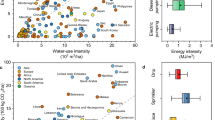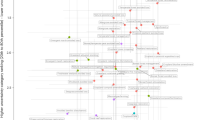Abstract
Carbon taxes are advocated as efficient fiscal and environmental policy tools, but they have proven difficult to implement. One reason is that carbon taxes can aggravate poverty by increasing prices of basic goods and services such as food, heating and commuting. Meanwhile, cash transfer programmes have been established as some of the most efficient poverty-reducing policies used in developing countries. We quantify how governments could mitigate negative social consequences of carbon taxes by expanding the beneficiary base or the amounts disbursed with existing cash transfer programmes. We focus on Latin America and the Caribbean, a region that has pioneered cash transfer programmes, aspires to contribute to climate mitigation and faces inequality. We find that 30% of carbon revenues could suffice to compensate poor and vulnerable households on average, leaving 70% to fund other political priorities. We also quantify trade-offs for governments choosing who and how much to compensate.
This is a preview of subscription content, access via your institution
Access options
Access Nature and 54 other Nature Portfolio journals
Get Nature+, our best-value online-access subscription
$29.99 / 30 days
cancel any time
Subscribe to this journal
Receive 12 digital issues and online access to articles
$119.00 per year
only $9.92 per issue
Buy this article
- Purchase on Springer Link
- Instant access to full article PDF
Prices may be subject to local taxes which are calculated during checkout





Similar content being viewed by others
Data availability
Households surveys for all countries but Guatemala and Honduras are readily available online (Supplementary Table 1). Input–output tables from the GTAP database are available for a fee from https://www.gtap.agecon.purdue.edu/
Code availability
The code used to simulate the impact of different carbon redistribution schemes is available at https://github.com/walshb1/LAC_carbon_taxes_vogtschilb_etal_natsust
Change history
27 June 2022
A Correction to this paper has been published: https://doi.org/10.1038/s41893-022-00935-3
References
McCollum, D. L. et al. Energy investment needs for fulfilling the Paris Agreement and achieving the sustainable development goals. Nat. Energy3, 589–599 (2018).
Rao, N. D., Riahi, K. & Grubler, A. Climate impacts of poverty eradication. Nat. Clim. Change4, 749–751 (2014).
Hubacek, K. et al. in Environmental and Economic Impacts of Decarbonization: Input-Output Studies on the Consequences of the 2015 Paris Agreements (eds Dejuán, O. et al.) chapter 5 (Routledge, 2017).
Jakob, M. et al. Carbon pricing revenues could close infrastructure access gaps. World Dev.84, 254–265 (2016).
Pachauri, S. et al. Pathways to achieve universal household access to modern energy by 2030. Environ. Res. Lett.8, 024015 (2013).
World Development Indicators (World Bank, 2015); https://datatopics.worldbank.org/world-development-indicators
Assessing Fiscal Space: An Update and Stocktaking (IMF, 2018).
Stiglitz, J. & Stern, N. Report of the High-Level Commission on Carbon Prices (Carbon Pricing Leadership Coalition, 2017).
Coady, D., Parry, I., Sears, L. & Shang, B. How large are global fossil fuel subsidies? World Dev.91, 11–27 (2017).
Springmann, M. et al. Options for keeping the food system within environmental limits. Nature562, 519–525 (2018).
Parry, I., Veung, C. & Heine, D. How much carbon pricing is in countries’ own interests? The critical role of co-benefits. Clim. Change Econ.6, 1550019 (2015).
Gillis, J. Forget the carbon tax for now. The New York Times (27 December 2018).
Agren, D. Mexico protests: how gas prices lit the flame under a quietly smoldering rage. The Guardian (9 January 2017).
Dorband, I. I., Jakob, M., Kalkuhl, M. & Steckel, J. C. Poverty and distributional effects of carbon pricing in low- and middle-income countries—a global comparative analysis. World Dev.115, 246–257 (2019).
Klenert, D. et al. Making carbon pricing work for citizens. Nat. Clim. Change8, 669–677 (2018).
Vogt-Schilb, A. & Hallegatte, S. Climate policies and nationally determined contributions: reconciling the needed ambition with the political economy. Wiley Interdiscip. Rev. Energy Environ.6, e256 (2017).
Trebilcock, M. J. Dealing with Losers: The Political Economy of Policy Transitions (Oxford Univ. Press, 2014).
Arze del Granado, F. J., Coady, D. & Gillingham, R. The unequal benefits of fuel subsidies: a review of evidence for developing countries. World Dev.40, 2234–2248 (2012).
Coady, D., Parry, I. W. H. & Shang, B. Energy price reform: lessons for policymakers. Rev. Environ. Econ. Policy12, 197–219 (2018).
Feltenstein, A. Subsidy Reforms and Implications for Social Protection: An Analysis of IMF Advice on Food and Fuel Subsidies IEO Background Paper No. BP/17-01/02 (IMF, 2017).
Beaton, C. et al. A Guidebook to Fossil-Fuel Subsidy Reform for Policy-Makers in Southeast Asia (International Institute for Sustainable Development/Global Subsidies Initiative, 2013); http://www.iisd.org/gsi/sites/default/files/ffs_guidebook_exec.pdf
Vagliasindi, M. Implementing Energy Subsidy Reforms: An Overview of the Key Issues Policy Research Working Paper 6122 (World Bank, 2012).
Rentschler, J. & Bazilian, M. Policy monitor—principles for designing effective fossil fuel subsidy reforms. Rev. Environ. Econ. Policy11, 138–155 (2017).
Fay, M. et al. Decarbonizing Development: Three Steps to a Zero-Carbon Future (World Bank, 2015).
Skovgaard, J. & van Asselt, H. (eds) The Politics of Fossil Fuel Subsidies and Their Reform (Cambridge Univ. Press, 2018).
Bastagli, F. et al. Cash Transfers: What Does the Evidence Say? A Rigorous Review of Programme Impact and of the Role of Design and Implementation Features (ODI, 2016).
Duryea, S. & Robles, M. Family Legacy: Breaking the Mold or Repeating Patterns? (IDB, 2017).
Ibarrarán, P. et al. (eds) How Conditional Cash Transfers Work (IDB, 2017).
Olson, M. The Logic of Collective Action: Public Goods and the Theory of Groups (Harvard Univ. Press, 1977).
Feng, K., Hubacek, K., Liu, Y., Marchán, E. & Vogt-Schilb, A. Managing the distributional effects of energy taxes and subsidy removal in Latin America and the Caribbean. Appl. Energy225, 424–436 (2018).
Alvarez, M. Distributional effects of environmental taxation: an approximation with a meta-regression analysis. Econ. Anal. Policy (2018).
Coady, D. P., Flamini, V. & Sears, L. The Unequal Benefits of Fuel Subsidies Revisited: Evidence for Developing Countries Working Paper No. 15/250 (IMF, 2015).
Jenkins, J. D. Political economy constraints on carbon pricing policies: what are the implications for economic efficiency, environmental efficacy, and climate policy design? Energy Policy69, 467–477 (2014).
Carattini, S., Baranzini, A., Thalmann, P., Varone, F. & Vöhringer, F. Green taxes in a post-Paris world: are millions of nays inevitable? Environ. Resour. Econ.68, 97–128 (2017).
Dresner, S., Dunne, L., Clinch, P. & Beuermann, C. Social and political responses to ecological tax reform in Europe: an introduction to the special issue. Energy Policy34, 895–904 (2006).
Drews, S. & Bergh, J. C. J. Mvanden What explains public support for climate policies? A review of empirical and experimental studies. Clim. Policy16, 855–876 (2016).
Kallbekken, S. & Sælen, H. Public acceptance for environmental taxes: self-interest, environmental and distributional concerns. Energy Policy39, 2966–2973 (2011).
Rausch, S., Metcalf, G. E. & Reilly, J. M. Distributional impacts of carbon pricing: a general equilibrium approach with micro-data for households. Energy Econ.33, S20–S33 (2011).
Symons, E., Proops, J. & Gay, P. Carbon taxes, consumer demand and carbon dioxide emissions: a simulation analysis for the UK. Fisc. Stud.15, 19–43 (1994).
Bento, A. M., Jacobsen, M. R. & Liu, A. A. Environmental policy in the presence of an informal sector. J. Environ. Econ. Manag.90, 61–77 (2018).
Goulder, L. H. Climate change policy’s interactions with the tax system. Energy Econ.40, S3–S11 (2013).
Metcalf, G. E. Using the tax system to address competition issues with a carbon tax. Natl Tax. J.67, 779 (2014).
Williams, R. C. I. I. I., Gordon, H., Burtraw, D., Carbone, J. C. & Morgenstern, R. D. The initial incidence of a carbon tax across income groups. Natl Tax. J.68, 195–214 (2015).
Hanna, R. & Olken, B. A. Universal basic incomes versus targeted transfers: anti-poverty programs in developing countries. J. Econ. Perspect.32, 201–226 (2018).
Economists’ statement on carbon dividends. Wall Street Journal (16 January 2019).
Renner, S. Poverty and distributional effects of a carbon tax in Mexico. Energy Policy112, 98–110 (2018).
Cerutti, P. et al. Social Assistance and Labor Market Programs in Latin America: Methodology and Key Findings from the Social Protection Database Social Protection and Labor Discussion Paper No. 1401 (World Bank, 2014).
Epstein, R. A. Takings: Private Property and the Power of Eminent Domain (Harvard Univ. Press, 1985).
Kaplow, L. Transition policy: a conceptual framework. J. Contemp. Leg. Issues13, 161–209 (2003).
Hubacek, K., Baiocchi, G., Feng, K. & Patwardhan, A. Poverty eradication in a carbon constrained world. Nat. Commun.8, 912 (2017).
Choi, J.-K., Bakshi, B. R., Hubacek, K. & Nader, J. A sequential input–output framework to analyze the economic and environmental implications of energy policies: gas taxes and fuel subsidies. Appl. Energy184, 830–839 (2016).
Feng, K. et al. Distributional effects of climate change taxation: the case of the UK. Environ. Sci. Technol.44, 3670–3676 (2010).
Ogarenko, I. & Hubacek, K. Eliminating indirect energy subsidies in Ukraine: estimation of environmental and socioeconomic effects using input–output modeling. J. Econ. Struct.2, 7 (2013).
Wang, Q., Hubacek, K., Feng, K., Wei, Y.-M. & Liang, Q.-M. Distributional effects of carbon taxation. Appl. Energy184, 1123–1131 (2016).
Kerkhof, A., Nonhebel, S. & Moll, H. Relating the environmental impact of consumption to household expenditures: an input-output analysis. Ecol. Econ.68, 1160–1170 (2009).
Wier, M., Birr-Pedersen, K., Jacobsen, H. K. & Klok, J. Are CO2 taxes regressive? Evidence from the danish experience. Ecol. Econ.52, 239–251 (2005).
Schaffitzel, F., Jakob, M., Soria, R., Vogt-Schilb, A. & Ward, H. Can Government Transfers Make Energy Subsidy Reform Socially Acceptable?: A Case Study on Ecuador Working Paper 01026 (IDB, 2019).
Duarte, R. et al. Modeling the carbon consequences of pro-environmental consumer behavior. Appl. Energy184, 1207–1216 (2016).
Miller, R. E. & Blair, P. D. Input-Output Analysis: Foundations and Extensions (Cambridge Univ. Press, 2009).
Coady, D., Flamini, V. & Sears, L. The Unequal Benefits of Fuel Subsidies Revisited: Evidence for Developing Countries Working Paper 15/250 (IMF, 2015).
Acknowledgements
This paper is dedicated to the memory of Sofia del Risco Bravo. We acknowledge funding support from the Inter-American Development Bank (projects no. RG-T2728 and RG-E1563). K.F. acknowledges funding support from the University of Maryland’s BSOS Dean’s Research Initiative Award. Y.L. acknowledges funding support from the National Natural Science Foundation of China (grant no.71974186) and the National Key Research and Development Program of China (grant no. 2016YFA0602500). We thank M. L. Oliveri, P. Keefer, the crowd at Bethany Beach and the participants of an IDB seminar of the Carbon Pricing Leadership Coalition, World Bank’s International Research Conference on Carbon Pricing 2019, for useful comments and feedback. The opinions expressed in this paper are those of the authors and do not necessarily reflect the views of the Inter-American Development Bank, its Board of Directors or the countries they represent.
Author information
Authors and Affiliations
Contributions
A.V.-S., B.W. and K.F. designed the research; A.V.-S, Y.L., K.F., L.D.C., D.Z. and M.R. prepared the data; A.V.-S., B.W. and K.F. conducted the analyses; A.V.-S., B.W., K.F., L.D.C., Y.L., D.Z., M.R. and K.H. wrote the paper.
Corresponding author
Ethics declarations
Competing interests
The authors declare no competing interests.
Additional information
Publisher’s note Springer Nature remains neutral with regard to jurisdictional claims in published maps and institutional affiliations.
Supplementary Information
Supplementary Information
Supplementary Methods, Figs. 1–99 and Tables 1–34.
Rights and permissions
About this article
Cite this article
Vogt-Schilb, A., Walsh, B., Feng, K. et al. Cash transfers for pro-poor carbon taxes in Latin America and the Caribbean. Nat Sustain 2, 941–948 (2019). https://doi.org/10.1038/s41893-019-0385-0
Received:
Accepted:
Published:
Issue Date:
DOI: https://doi.org/10.1038/s41893-019-0385-0
This article is cited by
-
Burden of the global energy price crisis on households
Nature Energy (2023)
-
Distributional impacts of carbon pricing in developing Asia
Nature Sustainability (2021)
-
Economic development and converging household carbon footprints in China
Nature Sustainability (2020)



